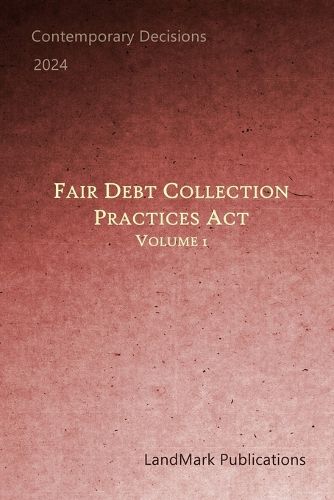Readings Newsletter
Become a Readings Member to make your shopping experience even easier.
Sign in or sign up for free!
You’re not far away from qualifying for FREE standard shipping within Australia
You’ve qualified for FREE standard shipping within Australia
The cart is loading…






THIS CASEBOOK contains a selection of U. S. Court of Appeals decisions that analyze, discuss and interpret provisions of the Fair Debt Collection Practices Act. Volume 1 of the casebook covers the District of Columbia Circuit and the First through the Fifth Circuit Court of Appeals.
Attempting to collect on a time-barred debt does not per se violate the FDCPA. Manuel, 956 F.3d at 829; see also Mahmoud v. De Moss Owners Ass'n, Inc., 865 F.3d 322, 333 (5th Cir. 2017) (holding it was not a violation of the FDCPA to collect a partially time-barred debt when only a small portion was subject to the statute of limitations); Holzman v. Malcolm S. Gerald & Assocs., Inc., 920 F.3d 1264, 1273-74 (11th Cir. 2019) ("[C]ourts generally have recognized that the FDCPA does not impose a bright-line rule prohibiting debt collectors from attempting to collect on time-barred debt."). But a debt-collector can run afoul of the FDCPA by threatening judicial action while completely failing to mention that a limitations period might affect judicial enforceability. Manuel, 956 F.3d at 831 (emphasizing that disclosure of a potential limitations problem "might give a consumer at least some inkling that the debt might be too old to be legally enforceable"). As we have explained:
When a collection letter creates confusion about a creditor's right to sue, that is illegal. The FDCPA singles out as unlawful the false representation of the character, amount, or legal status of any debt. Whether a debt is legally enforceable is a central fact about the character and legal status of that debt. A misrepresentation about the limitations period amounts to a straightforward violation of ? 1692e(2)(A).
Daugherty v. Convergent Outsourcing, Inc., 836 F.3d 507, 512 (5th Cir. 2016) (quotation omitted).
$9.00 standard shipping within Australia
FREE standard shipping within Australia for orders over $100.00
Express & International shipping calculated at checkout
THIS CASEBOOK contains a selection of U. S. Court of Appeals decisions that analyze, discuss and interpret provisions of the Fair Debt Collection Practices Act. Volume 1 of the casebook covers the District of Columbia Circuit and the First through the Fifth Circuit Court of Appeals.
Attempting to collect on a time-barred debt does not per se violate the FDCPA. Manuel, 956 F.3d at 829; see also Mahmoud v. De Moss Owners Ass'n, Inc., 865 F.3d 322, 333 (5th Cir. 2017) (holding it was not a violation of the FDCPA to collect a partially time-barred debt when only a small portion was subject to the statute of limitations); Holzman v. Malcolm S. Gerald & Assocs., Inc., 920 F.3d 1264, 1273-74 (11th Cir. 2019) ("[C]ourts generally have recognized that the FDCPA does not impose a bright-line rule prohibiting debt collectors from attempting to collect on time-barred debt."). But a debt-collector can run afoul of the FDCPA by threatening judicial action while completely failing to mention that a limitations period might affect judicial enforceability. Manuel, 956 F.3d at 831 (emphasizing that disclosure of a potential limitations problem "might give a consumer at least some inkling that the debt might be too old to be legally enforceable"). As we have explained:
When a collection letter creates confusion about a creditor's right to sue, that is illegal. The FDCPA singles out as unlawful the false representation of the character, amount, or legal status of any debt. Whether a debt is legally enforceable is a central fact about the character and legal status of that debt. A misrepresentation about the limitations period amounts to a straightforward violation of ? 1692e(2)(A).
Daugherty v. Convergent Outsourcing, Inc., 836 F.3d 507, 512 (5th Cir. 2016) (quotation omitted).